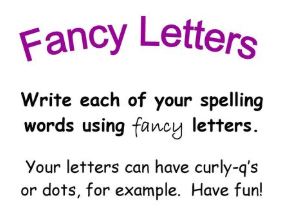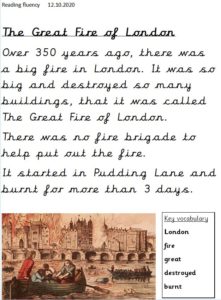Use last week’s spellings and write them in fancy writing – any you choose!

Year 1
- has
- he
- here
- his
- house
Year 2
- of
- push
- once
- put
- one
- said
- our
- saw
- pull
- says
Use last week’s spellings and write them in fancy writing – any you choose!

Year 1
Year 2
This week’s homework is Creative and is due on Thursday 22 October.
As we are reaching the end of the half term, we wanted to use this opportunity to see how much you’ve learned during our Science unit:
I can share what I’ve learned during ‘Living things and their habitats’.
Here a couple of ideas that might help you to get started:
Send your work into your class teacher.
The phonics screening check determines how well a child can use the phonics skills they have learned in year 1, ensuring that they are on track to become fluent readers.
Next half term, the phonics screening check will be taken by all children in year 2. Year 2 pupils who do not meet the expected standard in the autumn check will take the statutory check in June 2021, alongside year 1 pupils.
The phonics screening check contains 40 words divided into two sections. Both sections contain a mixture of real words and alien words.



The children are encouraged to add sound buttons or use phoneme fingers to read a word. Here is a video showing how we do this.
You can help your child at home by reading anything and everything!
Here is your home learning for this week with a welcome video from Mrs Latham.
Maths
This week’s maths learning is linked counting and place value.
Year 1
You don’t have to print the worksheets. Your child can write or draw their answers on paper. Your child’s learning will be most effective if you sit with them to pause the clip and check / praise / support your child as the clip moves on.
(Suggested time: 30 minutes of Maths and 15 minutes of Rockstars daily)
Spelling
Look on the homework page to find this week’s spellings. Your child should complete one task each day.
(Suggested time: 15-20 minutes daily)
Reading fluency
This is the text we’re using in class this week to build up fluency skills.

In school, we generally follow this sequence:
(Suggested time: 15 minutes daily)
Reading comprehension and phonics
Day 1: We’ll be using this ‘RIC’ text in class to practise comprehension skills. RIC stands for:
Day 2: Agree with your child three words from any text they’ve read which they’re less familiar with. Your child should find out what they mean (eg by checking an online dictionary or simply discuss with you) and how to use them in sentences (both when speaking and when writing). Challenge your child to write a sentence with each word in, or to drop the words into conversations at home.
Day 3: These video lessons for from BBC Bitesize links to the phonics sounds for ‘or’, ‘ur’ and ‘ow’. Watch the video and complete the activities.
Day 4: Go on a sound hunt around your house and find as many things as you can that contain the phonics sounds ‘or’, ‘ur’ and ‘ow’. Write a list of all the things you find. Challenge : Write sentences containing some of the words.
Day 5: Book Club. Once a week, we have a relaxing lesson where we sit and read quietly, often with an adult. You can read the books you take home from school or some of your own books.
(Suggested time: 30 minutes daily)
Writing
Activity 1:
Year 1 children: Talk to your child about a picture or photograph you choose. Write three words or phrases to label different things in the picture (eg ‘a car’ or ‘a red car’). Your child should aim to spell in a sensible way and use finger spaces between the words, joining up letters if they can (use our handwriting guide to help).
Activity 2:
Finger strengthening activities support the development of fine motor skills needed for writing.
Challenge your child to have a go at 3 or more of these activities: practise tying shoe laces, fasten and unfasten buttons, attach nuts and bolts, separate dried pasta and dried peas (or similar) into two separate piles, do some mindfulness colouring in, do a jigsaw, cut up drinking straws and thread them on to a shoe lace, attach clothes pegs (the squeezable type) to a shoe box or similar, use a paint brush and water to make pictures or words on a wall, chalk words or pictures on the ground, make a Lego model.
(Suggested time: 30 minutes daily)
Topic
This week’s topic learning is History. We are starting to learn about the Great Fire of London. We are reading this book :

You could search for a video of it on You Tube.
(Suggested time: 30 minutes)
Science
We’re learning about food chains, predators and prey. This video will really help to support learning at home. Have a go at drawing a food chain, labelling who is the predator/prey.
(Suggested time: 30-45 minutes)
Here is your home learning for this week with a welcome video from Mrs Latham.
Maths
This week’s maths learning is linked to ordering numbers and counting in 2s, 3s, 5s and 10s.
Year 2
You don’t have to print the worksheets. Your child can write or draw their answers on paper. Your child’s learning will be most effective if you sit with them to pause the clip and check / praise / support your child as the clip moves on.
(Suggested time: 30 minutes of Maths and 15 minutes of Rockstars daily)
Spelling
Look on the homework page to find this week’s spellings. Your child should complete one task each day.
(Suggested time: 15-20 minutes daily)
Reading fluency
This is the text we’re using in class this week to build up fluency skills.

In school, we generally follow this sequence:
(Suggested time: 15 minutes daily)
Reading comprehension and phonics
Day 1: We’ll be using this ‘RIC’ text in class to practise comprehension skills. RIC stands for:
Day 2: Agree with your child three words from any text they’ve read which they’re less familiar with. Your child should find out what they mean (eg by checking an online dictionary or simply discuss with you) and how to use them in sentences (both when speaking and when writing). Challenge your child to write a sentence with each word in, or to drop the words into conversations at home.
Day 3: These video lessons for from BBC Bitesize links to the phonics sounds for ‘or’, ‘ur’ and ‘ow’. Watch the video and complete the activities.
Day 4: Go on a sound hunt around your house and find as many things as you can that contain the phonics sounds ‘or’, ‘ur’ and ‘ow’. Write a list of all the things you find. Challenge : Write sentences containing some of the words.
Day 5: Book Club. Once a week, we have a relaxing lesson where we sit and read quietly, often with an adult. You can read the books you take home from school or some of your own books.
(Suggested time: 30 minutes daily)
Writing
Activity 1:
Year 2 children: Write three sentences about a picture or photograph you choose. Your child should remember capital letters, finger spaces, joining up letters if they can (use our handwriting guide to help), and a full stop, exclamation mark (!) or question mark (?) to end the sentence.
Activity 2:
Finger strengthening activities support the development of fine motor skills needed for writing.
Challenge your child to have a go at 3 or more of these activities: practise tying shoe laces, fasten and unfasten buttons, attach nuts and bolts, separate dried pasta and dried peas (or similar) into two separate piles, do some mindfulness colouring in, do a jigsaw, cut up drinking straws and thread them on to a shoe lace, attach clothes pegs (the squeezable type) to a shoe box or similar, use a paint brush and water to make pictures or words on a wall, chalk words or pictures on the ground, make a Lego model.
(Suggested time: 30 minutes daily)
Topic
This week’s topic learning is History. We are starting to learn about the Great Fire of London. We are reading this book :

You could search for a video of it on You Tube.
(Suggested time: 30 minutes)
Science
We’re learning about food chains, predators and prey. This video will really help to support learning at home. Have a go at drawing a food chain, labelling who is the predator/prey.
(Suggested time: 30-45 minutes)
It’s Friday again…another learning-packed week.
As we can’t have our usual celebration assembly on a Friday at the moment, we will be posting the certificate winners on here each week for each class.
For great learning…
Georgia – for great learning in writing. You wrote some super sentences this week!
For sport and physical activity…
Lani – for super enthusiasm in PE and WUSU (Wake Up Shake Up).
For living and learning…
Kyan – for being an active learner. You often have your hand up and like to contribute in lessons. Well done!
We have begun a topic on mental health in our Living and Learning lessons. This week, we have talked about our feelings. Knowing that it is fine to have different emotions, that they change frequently and that they don’t last forever can help children manage their own feelings and behaviour.
This week’s spellings are more common exception words (words that don’t follow the usual spelling rules). There are lots of ideas in our super spelling strategies to help you child learn them.
Year 1
Year 2
I can share my views about health
In our Living and Learning lessons we have been talking about recognising how others are feeling. This includes spotting signs that show us that our friends are happy or sad. We watched this video about Elmer and his friends. We talked about how what we do can affect other people’s feelings. (This is a YouTube link. Top tip for watching YouTube with your child: go to the settings cog along the play bar and turn off autoplay – this avoids an inappropriate clip coming up automatically, and helps to discourage your child from passively watching clip after clip.)